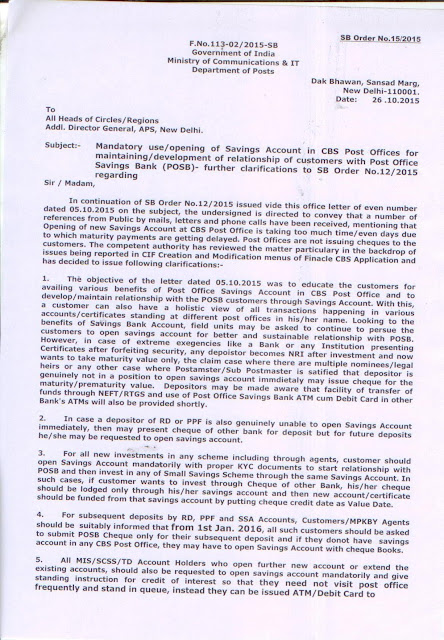|
ALL INDIA
ASSOCIATION OF
INSPECTORS
& ASST. SUPERINTENDENTS OF POSTS
ODISHA CIRCLE
BRANCH, BHUBANESWAR 751001
|
|
Shri Debi Prasad Nayak
President
9437124058
|
Shri Pitabasa Jena
Circle Secretary
Phone: 09437630182
|
Shri Debadatta Jena
Treasurer
9178739173
|
NOTICE
No. AIAIPASP/CWC-3/2015 Dated 20/10/2015
Under the
provisions of Article-46 of the Constitution of All India Association of
Inspectors and Asst. Superintendents of Posts, it is hereby notified that a
meeting of the Circle Working
Committee of the Association will
be held on Sunday, the 15th November,
2015 at 10.30 hrs at Postal Recreation Club (PRC) of
Bhubaneswar GPO.
The agenda for the meeting will be as under:
1.
Confirmation of the proceedings of the last CWC.
2.
Brief on development of various issues in the Circle / agendas
taken up at Circle / RO level.
3.
Issues to be taken up with
Administration.
4.
All India Conference scheduled to be held on 13th and
14th February, 2016 at Jaipur (Rajsthan)
5.
Next Biennial Conference of Circle Branch
6.
Organizational and Financial Review.
7.
Any other item with the permission of the Chair.
Shri S.B. Mohapatra, Former CHQ President and Shri B.B.
Mohanty, Former Circle Secretary now SPOs, Bhadrak Division, Bhadrak will
be the special invitees/guests in the CWC meeting.
All
office-bearers, CWC members and the local members are requested to attend the
said meeting.
Members who are
neither office-bearers nor CWC members but willing to join the CWC meeting
(without the provision of special CL) are also welcome to attend the CWC
meeting as invitees.
(Pitabasa Jena)
Circle Secretary
Copy to:
1. The
Chief Postmaster General, Odisha Circle, Bhubaneswar for kind information.
Necessary orders may kindly be issued to all concerned for grant of special
casual leave to office bearers and CWC members as per the enclosed list.
2. Sri Vilas
Ingale, General Secretary, AI Assn of Inspectors & ASPs, CHQ, New Delhi (Senior Postmaster, Thane HO 400601) for information.
3. The
President and all office-bearers and CWC members of the Association.
5. Shri S.B. Mohapatra, Former CHQ President for kind information. He is cordially
invited to grace the CWC meeting as a Special Invitee/Guest.
6. Sri B.B. Mohanty, Former Circle Secretary now SPOs, Bhadrak Division,
Bhadrak-756100 for kind information. He is cordially invited to grace the CWC
meeting as a Special Invitee/Guest.
7. The
Sr. Postmaster, Bhubaneswar GPO, Bhubaneswar -751001 for kind information.
8. The Secretary, PRC, Bhubaneswar GPO for
information.
Circle Secretary
AIAIASP, Odisha Circle Branch



